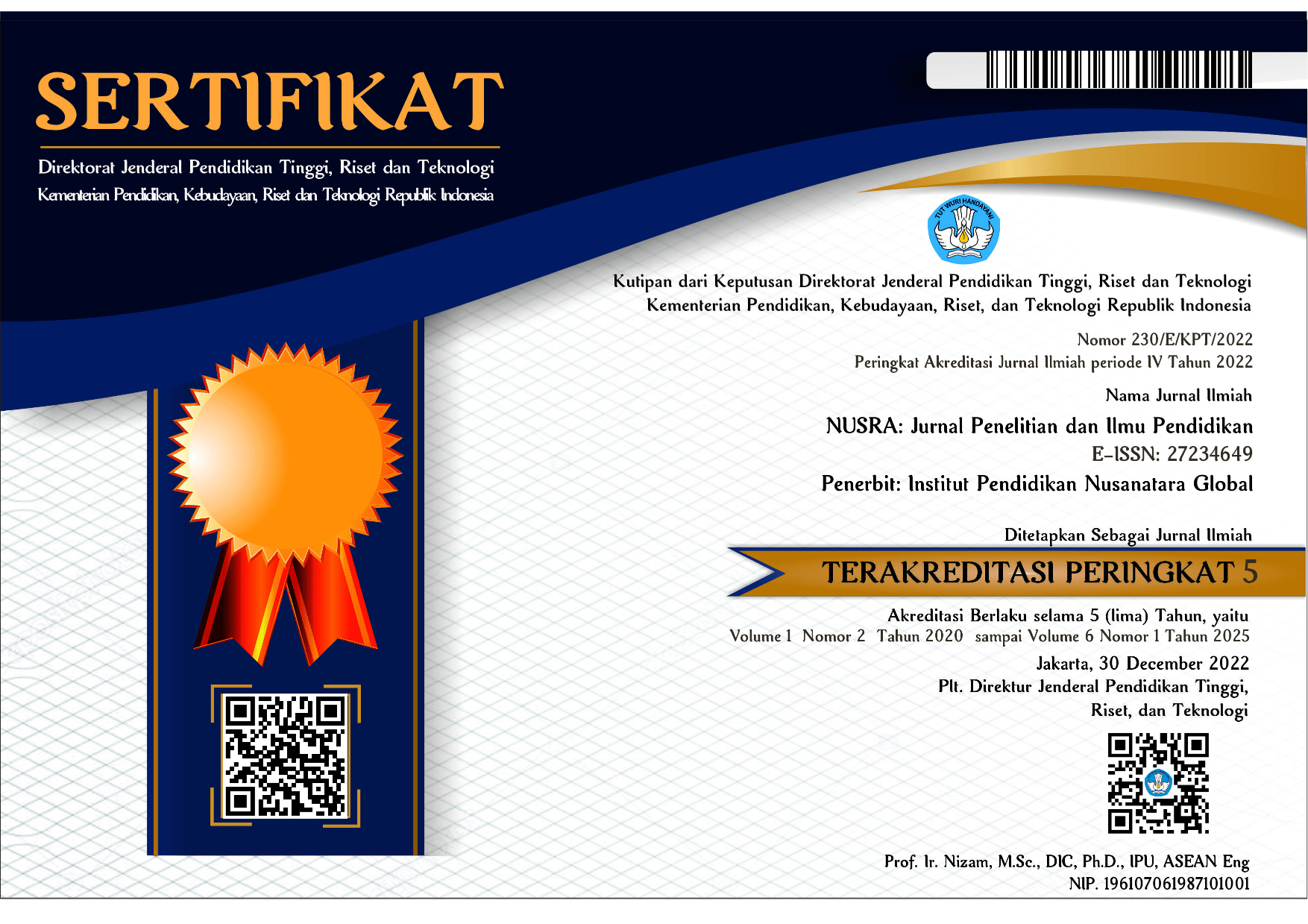Challenges in E3 Listening Skills: Perspectives of Universitas Advent Indonesia Students
DOI:
https://doi.org/10.55681/nusra.v5i2.2614Keywords:
Challenges, Listening Skill, E3, Student PerceptionsAbstract
This study investigated Universitas Advent Indonesia's perceptions of the challenges and importance of E3 English listening skills in the context of academic and career development. Using a quantitative approach and data collection through a closed Likert-type questionnaire, 125 students from various study programs at Universitas Advent Indonesia responded to the study. The analysis showed that most students experienced several challenges in developing their listening skills, with 45.3% agreeing that such barriers existed. However, they also recognize the importance of listening skills, with 49.67% agreeing that it is vital to their academic success. Furthermore, 52.97% of the students agreed that the strategies used in the listening test were effective methods to improve their comprehension. In addition, most respondents supported recommendations to improve the teaching and learning of listening skills at Adventist University, with 50.93% agreeing with such efforts. This study sheds important light on the development of listening skills in higher education and provides valuable insights for efforts to improve them.
Downloads
References
Ahmadi, S. M. (2016). The importance of listening comprehension in language learning. International Journal of Research in English Education, 1(1)
Alzamil, J. (2021). Listening Skills: Important but Difficult to Learn. Arab World English Journal (AWEJ) Volume 12. Number 3 September 2021. Available at SSRN: https://ssrn.com/abstract=3952957 or http://dx.doi.org/10.2139/ssrn.3952957
Brown, H. D. (2000). Principles of language learning and teaching (4th ed.). Longman.
Brown, H. D. (2007). Principles of Language Learning and Teaching (5th ed.). Pearson Education.
Brown, J. D. (2015). Feedback in language learning: Integrating research and practice. Cambridge University Press.
Brown, J. D. (2015). Listening comprehension: Processes, strategies, and interventions. Routledge.
Clark, A. (2019). The Impact of Diverse Listening Materials on Language Comprehension. Journal of Language Education and Development, 3(2), 45–58.
Cuncic, A. (2024). Active Listening Techniques for Better Communication. Retrieved from [Active Listening: Techniques, Benefits, Examples (verywellmind.com)].
Garcia, M. (2021). The Role of Peer Mentoring in Language Learning. International Journal of Applied Linguistics, 28(4), 567–582.
Gordon, T. (1974). Teacher Effectiveness Training. New York: Peter H. Wyden.
Johnson, K. E. (2020). Strategic processing in language learning: A sociocultural perspective. Routledge.
Johnson, K. E. (2020). Teaching listening: Strategies, interpretation, and resources. Cambridge University Press.
Jones, L. (2018). Enhancing Language Learning through Interactive Activities. Modern Language Journal, 102(3), 567–580.
Kurita, T. (2012). Issues in Second Language Listening Comprehension and the Pedagogical Implications. Accents Asia, 5(1), 30–44.
Longman. (2004). Longman Dictionary of Contemporary English. Pearson Education Limited.
Melander-Smith, S. (2005). The Importance of Effective Listening Skills in the Workplace. The Journal of Human Resources and Adult Learning, 1(1), 1–10.
Oray, R. (2019). Listening abilities are crucial in language acquisition, intercultural communication, collaboration, and professional success in today's globalized world. Research Journal of English (RJOE), 4(1). Retrieved from http://www.rjoe.org.in/
Pourhosein Gilakjani, A., & Sabouri, N. B. (2016). Learners’ Listening Comprehension Difficulties in English Language Learning: A Literature Review. English Language Teaching, 9(6), 123–133.
Ramapela, S. S. (2014). The influence of language competency on learner achievement: A case study of Grade 12 learners and educators in Capricorn District, Limpopo Province, South Africa. PhD thesis. The Tshwane University of Technology.
Richards, J. C. (2019). Language teaching methodology. Cambridge University Press.
Rost, M. (1994). Introducing Listening. London: Penguin books.
Smith, K. (2020). Supporting Listening Comprehension in Language Education. TESOL Quarterly, 54(2), 345–360.
Smith, M. (2018). Critical thinking in language learning: A role for cooperative learning. Routledge.
Smith, M. (2018). Memory and learning strategies for listening. Language Teaching, 51(3), 394–418.
Solita, R., Harahap, A., & Lubis, A. A. (2021). The teacher talks in an English foreign language classroom. Journal of English Education and Teaching, 5(2), 302-316.
Thomas Gordon. (1974). Teacher Effectiveness Training. New York: Peter H. Wyden.
Vandergrift, L. (2007). Recent Developments in Second and Foreign Language Listening Comprehension Research. Language Teaching, 40(3), 191-210.
Downloads
Published
How to Cite
Issue
Section
License
Copyright (c) 2024 Anisa Nurjanah, Nelson Balisar Panjaitan

This work is licensed under a Creative Commons Attribution-ShareAlike 4.0 International License.














